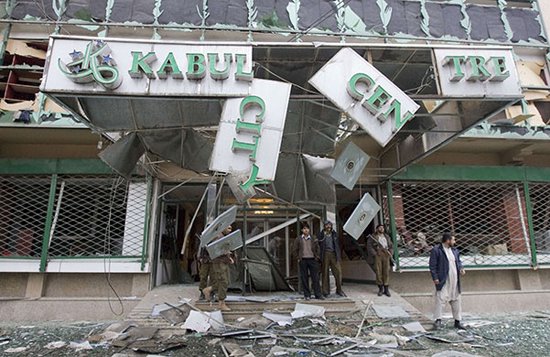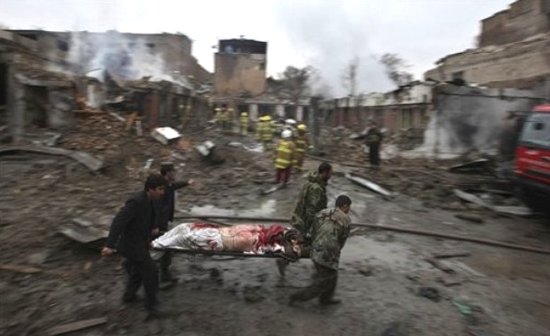
Military personnel stand in front of Kabul City Centre shopping mall after a bomb blast. (Photo: Reuters)
Suicide bombers mounted attacks in the heart of Kabul today, triggering a series of explosions and gun battles that killed at least 17 people, including Indian government officials.
The Taliban claimed responsibility, saying five suicide bombers conducted the early-morning attacks on two buildings in an area that is home to small residential hotels used by foreigners. The Indian foreign ministry said as many as nine of its nationals had been killed, including government officials. An Italian diplomat was also among the victims, according to the Italian foreign minister, Franco Frattini.
An Indian doctor, Surbod Sanjiv Paul, hid in his bathroom in one of the guesthouses for three hours when it came under attack.
"When I was coming out, I found two or three dead bodies," Paul said at a military hospital, where his wounded foot was bandaged. "When firing was going on, the first car bomb exploded and the full roof came on my head."
The attacks in Kabul came as thousands of US, Afghan and Nato soldiers were in the second week of a large-scale offensive against a Taliban stronghold in the town of Marjah in Helmand province.
More than two dozen senior and mid-level Taliban figures have been detained in Pakistan in recent weeks. The attack in Kabul could be a way for the militants to show that the insurgency remains potent.
At least 17 people were killed in today's attack and 32 wounded, said Abdul Ghafar Sayedzada, head of criminal investigation for the Kabul police. He said three of the dead were police officers and most of the civilians killed were Indians.
The targets were two residential hotels. A car bomb flattened the Hamid Guesthouse and assailants also attacked the nearby Park Residence, Sayedzada said. An Associated Press reporter saw police carry seven bodies from the Park Residence.
"I saw foreigners were crying and shouting," said Najibullah, a 25-year-old hotel worker who ran out into the rain-soaked street in his underwear when he heard the first explosion.

Afghan soldiers and security men carry away the body of an unidentified man from the scene of an explosion and a gun battle in Kabul. Feb 26, 2010. (Photo: AP)
Najibullah, whose face and hands were covered in blood, said he saw two suicide bombers at the site. "It was a very bad situation inside," he said. "God helped me, otherwise I would be dead. I saw one suicide bomber blowing himself up."
The explosions woke residents near the Kabul City Centre, a nine-storey shopping area that includes the four-star Safi Landmark hotel. Witnesses said one explosion created a crater about a metre wide and windows of the Safi hotel were blown out.
A large plume of black smoke rose from the area. Shattered glass littered the streets, which were mostly empty because it was the first day of the Afghan weekend. Afghan police, armed with Kalashnikov rifles, crouched behind traffic barriers with guns ready as shots sounded from several sides.
More than two hours after the first explosion, gunfire continued to ring out around one of the guest houses. Police with gas masks were trying to smoke out a suspected attacker in the basement of the building, according to a police officer at the scene who only gave his first name, Abdulrahman.
The Canadian embassy issued a statement saying the violence would not undermine international commitment to Afghanistan.
"Attacks, such as today's bombing, will not deter Canada or its international partners from its commitment to support Afghans in their efforts to create a stable, democratic and self-sufficient society," the embassy said.
Jack Barton, an Australian aid worker, said he had been awakened by a large blast that blew in the windows of the guesthouse where he was staying and filled the room with dust.
"There was very intense street fighting outside the guesthouse compound. It happened very close by. After an hour, it slowly drifted away," he said.
It was the first attack in the Afghan capital since 18 January, when teams of suicide bombers and gunmen targeted government buildings, leaving 12 dead, including seven attackers. On 15 December a suicide car bomber struck near a hotel frequented by foreigners, killing eight people.
On 28 October, gunmen with suicide vests stormed a small residential hotel, leaving 11 dead, including five UN staff and three attackers. Earlier that month, on 8 October, a suicide car bomber detonated his vehicle outside the Indian embassy, killing 17 people.
India is among the largest economic donors to Afghanistan apart from countries that have sent troops to the Nato-led mission. It is seeking regional allies and access to oil and gas-rich central Asia.
But India's growing role in the country is strongly opposed by Pakistan, which wants a friendly Afghan government without ties to its arch-rival, and by the Taliban because of Indian links to rival ethnic communities. Many of the Islamic extremist groups in the region have been fighting the Indians for years in Indian-controlled parts of Kashmir.



